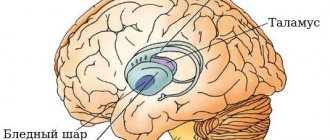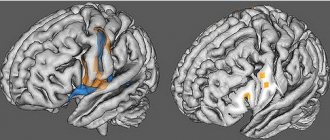Causes of systemic speech underdevelopment
A number of reasons can lead to the development of systemic speech underdevelopment in children. They are divided into internal and external. Internal ones include fetal hypoxia, severe toxicosis, pregnancy at too young or, on the contrary, late age, various maternal diseases, including gynecological ones, abortions, and of course the use of toxins, drugs, alcohol, smoking. Also, systemic underdevelopment of speech is observed in children who were injured during the birth process. External causes are a number of diseases and injuries received by a child in the first years of life. These include severe cases of acute respiratory viral infection, asthenia, various pathologies of the central nervous system, cerebral palsy, and rickets. The environment surrounding the child can also “contribute” to the development of SSD: incorrectly chosen method of education, constant stress within the family, excessive pressure on the child or neglect of his requirements, lack of communication. A child may imitate a lisping manner of communication towards himself. Hence the incorrect pronunciation of individual sounds and words.
Delayed speech development may be a consequence of improper functioning of other body systems. This is a hearing disorder, autism or mental retardation. The first signs of speech development disorders are observed in infancy: the baby reacts poorly to adults’ calls, does not strive to imitate them, does not make any sounds, and cannot point a finger at an object of interest to him.
Causes of speech disorders
At what stages of a child’s development and under what conditions and circumstances can damage to his speech apparatus occur, leading to speech disorders? And is it only damage to the speech apparatus that can lead to the appearance of speech disorders, or are such disorders possible even in the presence of a completely normal speech apparatus? Let's start from the very beginning. The child has not yet been born and is not even “programmed”, and various kinds of unfavorable factors can already be in full swing “working” on his speech and other pathologies. This is explained by the fact that the health and speech of the unborn child can be greatly influenced by unfavorable heredity and the incorrect lifestyle of the future parents. Some features of the neuropsychic make-up of parents, as well as structural features of the peripheral and central parts of the speech apparatus (for example, structural features of the articulatory organs, up to the presence of palatal clefts, or the peculiar development of certain brain structures related to the implementation of speech function) can be inherited ). However, the role of hereditary predisposition in the origin of speech pathology is not assessed equally by everyone: some researchers assign it an extremely large role, while others almost completely discount it. The truth here, as in most other similar situations, apparently lies somewhere in the middle. As for the life circumstances of future parents preceding the onset of pregnancy, the following are particularly dangerous: • occupational “hazards” that act very massively or for a long time (presence of radiation, working with chemically active substances, under conditions of increased vibration loads, etc.); P.); • drug addiction; • alcoholism and smoking; • artificial termination of previous pregnancies; • other harmful factors, the action of which leads to physical and neuropsychic exhaustion of future parents.
The normal course of intrauterine development of the fetus, and hence the normal formation of the central and peripheral parts of the speech apparatus, may be disrupted due to the influence of the following unfavorable factors: • toxicosis of the first and (or) second half of pregnancy; • acute and chronic diseases of the mother during pregnancy (influenza, rubella, renal and heart failure, endocrine disorders, etc.); • Rhesus conflict; • falls and bruises (especially in the abdominal area) of the mother during pregnancy; • occupational hazards that continue to operate during pregnancy; in addition to those noted above, heavy physical activity and night shift work are also unacceptable for the expectant mother during this period; • mother's smoking and drinking of alcoholic beverages; • stressful situations associated, for example, with family breakdown, death of close relatives, etc.; • attempts to terminate pregnancy that were not completed, inevitably disrupting the entire further course of normal intrauterine development of the fetus.
I would like to dwell in some detail on the dangers of maternal smoking during pregnancy, proven by special scientific research. According to echography, the child’s heart rate increases significantly while the mother is smoking, while the spontaneous movements of the fetus gradually stop - the child suffocates. Children born to smoking mothers are especially susceptible to respiratory diseases in the first three months of life. Their lung volume is reduced by about 5%, and their weight is reduced by 70-140 grams. If the mother smoked up to 10 cigarettes a day, the child's IQ was 9 points lower, since tobacco reduces the supply of oxygen and nutrients and thereby negatively affects brain development. The many chemical elements contained in tobacco smoke can disrupt the development of a child’s nervous system already in the prenatal period. Naturally, the effect of two or even several of the listed harmful factors can be observed simultaneously and that this significantly complicates the overall picture.
Any disturbances in the intrauterine development of the fetus, as it were, pre-program the complicated course of childbirth. This is explained by the fact that by the time labor occurs, the fetus is often not mature enough and therefore cannot take full part in its normal course (shoulder turning, active movement along the birth canal, etc.). This is what leads to the need to use various aids during childbirth, with all the ensuing undesirable consequences. At this extremely crucial moment, it is already difficult for the mother herself to change anything - all the actions of the medical staff applied to her and the child are dictated by the specific situation. Another thing is that preventing this situation at some much earlier stages largely depended on the future mother herself or even on both future parents. This will be discussed in more detail in the article devoted to the prevention of speech disorders.
During the early development of a child, the following circumstances may adversely affect the formation of his speech: • head injuries, concussions and bruises of the brain; • inflammatory diseases of the brain (meningitis, meningoencephalitis, etc.); • untreated inflammatory diseases of the middle and inner ear, leading to decreased or even complete loss of hearing; • the use of certain medications that selectively affect the auditory nerve and cause the same negative effects; • damage to the peripheral part of the speech apparatus acquired before the formation of speech (in particular, acquired anomalies in the structure of the jaws and teeth as a result of injuries, constant finger sucking, etc.); • the presence of speech defects in people around the child or their insufficient attention to his speech development.
To summarize everything that has been said about the causes of speech disorders, it is necessary to touch upon the classification of these causes, at least in the most general terms.
All causes of speech disorders are usually divided into two large groups - organic and functional. Organic causes include those causes whose action can lead to disruption of the anatomical structure of the speech apparatus in its peripheral or central parts. In particular, organic damage to the speech parts of the brain can be caused by disruption of the normal conditions of intrauterine development of the fetus, some types of mechanical assistance during childbirth, the state of prolonged asphyxia of the newborn, etc. Anomalies in the structure of the peripheral part of the speech apparatus can be caused hereditarily or be the result of unfavorable conditions. during pregnancy (the facial skeleton is formed in the second or third month), and can also be acquired after the birth of the child. Functional causes are usually classified as those whose action does not lead to a change in the structure of the speech apparatus itself, but only disrupts its normal functioning. Specifically, such reasons can be various kinds of stressful situations, frequent and long-term illnesses of a child at an early age, which have a debilitating effect on his nervous system and the body as a whole, incorrect methods of re-educating left-handed people (the feasibility of such re-education in itself is very doubtful), unfavorable speech-related social environment, etc.
However, the distinction between the causes of speech pathology into organic and functional is purely conditional and is most applicable only to cases of gross organic damage to the speech organs. This distinction is especially difficult when it comes to the central part of the speech apparatus: it is difficult to imagine purely functional changes with a completely normal brain structure. Apparently, in many cases, organic changes in it can be so insignificant that they simply cannot be detected by modern research methods. Therefore, it is no coincidence that in recent decades there has been so much talk about “minimal cerebral dysfunction” with its characteristic microorganic lesions of the brain matter.
According to I.P. Pavlov, we can talk about functional disorders of the brain cell only when it is damaged shallowly and is still able to get out of the inhibitory state, that is, when its change is reversible. If favorable conditions are provided, this cell can still return to normal functioning. With organic lesions, cell damage is irreversible. And it is especially important to understand the following: long-term functional disorders can become irreversible and thus become organic. That is why, for any speech disorders, the earliest possible correctional assistance for a child is so important!
And one more circumstance forces us to under no circumstances delay in providing the child with timely correctional assistance. The fact is that the presence of organic disorders in one part of the speech apparatus inevitably entails the occurrence of secondary functional disorders in its other parts. For example, organic disturbances in the structure of the articulatory apparatus directly cause only the appearance of sound pronunciation defects in a child. However, his constant auditory perception of sounds that he himself pronounces incorrectly leads to a secondary functional disorder in the work of the speech-hearing analyzer - the child begins to perceive the defective sound of sounds as normal (as if he “listens” to this sound). And if a child completely replaces one speech sound with another (says, for example, SARF instead of SHARF), then with the beginning of learning to read and write, a “tertiary” violation will almost inevitably appear - similar letter substitutions in writing. As a result, instead of one speech disorder, you will have to overcome as many as three.
It is very important for parents to understand that a child learns speech by imitation, therefore (at best) he can only master what he most often hears in the speech of the people around him. For this reason, he needs to be provided with the right role model to look up to from the very beginning. How does a child know how to speak? He looks at adults, listens and “peers” into their speech and tries to imitate it to the best of his age and other abilities, gradually getting closer and closer to the “proposed” model. And if he most often hears, for example, the “burry” R, then this is the pronunciation of this sound that he learns. This explains the cases of often occurring “family” burr, which many parents try to explain by “heredity.” Thus, there is a direct imitation of the wrong model here. The element of imitation also plays a significant role in the occurrence of stuttering.
The rapid, sloppy, confused speech of people around him also has an adverse effect on the formation of a child’s speech. Under these conditions, try to “examine” and hear how certain sounds are pronounced, try to grasp the sound-syllable structure of complex words, their endings, etc. The development of children’s speech in this case is usually significantly delayed, and the child involuntarily learns imitation and sloppy manner of speech. In cases where the speech of the adults who most often communicate with the child is poor in content and incorrect in grammatical format (poor vocabulary, incorrect coordination of words with each other), the child has no choice but to assimilate the “truncated” sample offered to him. In such families, they most often do not pay special attention to the child’s speech and do not correct it. Under such circumstances, experts usually talk about so-called pedagogical neglect.
It seems especially unreasonable to us to “babble” with children, which is expressed in adults adapting to children’s speech while reproducing all the irregularities in it. This is also one of the types of adverse social influence exerted on a child “of the free will” of the parents, but with no less negative consequences. Here the child is deprived of even the necessary incentive to improve his speech, since adults already express complete delight in its quality.
It’s a shame when, due to the unfavorable social influences discussed here, speech defects appear even in children with a normally structured speech apparatus, but this turns into completely catastrophic consequences for a child who has a speech apparatus that is defective in one way or another, which parents should well understand and take into account.
Speech disorders more often occur in boys, in whom the appearance of speech itself is observed at a slightly later date. This is due to the fact that boys develop the left hemisphere of the brain, which is “responsible” for speech function, later than girls. Compared to girls, the formation of interhemispheric interaction, which contributes to better compensation for various types of disorders, is also delayed.
Thus, the question of the causes of speech pathology is quite complex and requires simultaneous consideration of many unfavorable factors in their interaction.
However, in the practice of speech therapy work, it is necessary to look for an answer to it, since the effectiveness of overcoming speech disorders largely depends on the correctness of this answer. Trainer T4K buy - go to catalog
Forms of systemic speech underdevelopment
A mild degree of systemic speech underdevelopment is characterized by minor disturbances in sound pronunciation. The child begins to stammer only when he tries to say a complex phrase. He loses secondary lines of meaning in his attempts to convey the main idea. The child cannot use prepositions, “loses” conjunctions, does not always form the “noun-adjective” chain correctly, and gets confused in quantitative characteristics. Vocabulary is less than that of peers.
With an average degree of systemic underdevelopment of speech, the child “floats” in cases and genders and does not coordinate them with each other. As for speech, a violation is recorded only when trying to pronounce sounds of one group. Complex everyday words remain an unconquered peak for the baby. Words united by one semantic line are designated by the child as one word. For example, a sofa, a wardrobe, a TV, a carpet - this is all “home”.
Severe form of systemic speech underdevelopment.
The child cannot form a phrase from words, hence the incoherent speech. One sound can mean both “mother” and “eat”. The problem is in the pronunciation of several sound groups at once: voiced, voiceless, hissing, voiced - all are pronounced incorrectly. The child perceives speech with inhibition. The speech contains incorrect use of cases and numbers.
Systemic underdevelopment of speech against the background of mental retardation is complemented by increased physical activity, inability to concentrate, and poor memory.









